Antarctic
Life at the Poles
People keep on asking me what there is to see underwater in Antarctica. Seeing as I have dove yet I talked to the people I will be working with. When I went to Oban for dive week I dove with David Barnes one of the BAS scientists who will be coming down to Rothera. I will be taking him out on the boat so he can continue his scientific research. I came across an interesting article in which David talks about inventorying life at the poles.
Dr Barnes told BBC News: “There is a widely held belief that life is very rich in the tropics and decreases through temperate areas, through to polar regions, which are thought to be barren.
“That is partly because we see life from the land point of view – and when we see the Arctic and Antarctic, we just see ice.
“But below the surface of the sea, it is an incredibly rich environment, and diving there is a bit like diving on a coral reef.”
Enjoy the full article here.
Waste Removal
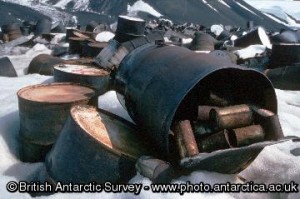
Antarctica is the largest wilderness on Earth with no permanent human inhabitants. However, the continent hosts 10,000 scientists and support staff in the summer. Removal of human created waste is a very important necessity to stop our impact on the pristine wilderness. To comply with the treaty we are given oil spill response training, waste management training etc. Check out BAS’s website about this important issue.
Getting ready…
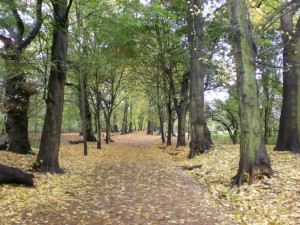
I am leaving to go south in 10 days and it is fall/winter in the UK the leaves are looking beautiful. Last week after crane driving I spent the week working on my fathers boat, cleaning out the attic in my parents house, seeing friends, writing birthday cards, sorting out christmas cards and presents. This week I am visiting friends some more helping my mum with a Guy Fawkes party, having my hair cut (I have been dared by a friend to shave it all off!), packing my 23kg allowance (a hard thing to do) and working some more on Dad’s boat. So just a lot of mundane running around chores! Soon enough I will be on the plane headed to Madrid then Santiago, Falklands and Rothera.
Have a great week.
Ash
 This is a picture taken on Hampstead Heath where I went for a walk with a friend.
This is a picture taken on Hampstead Heath where I went for a walk with a friend.
Other Bases of Antarctica and the Treaty
Answering some more questions I have received!
There are many other bases in Antarctica however, we don’t get together and have tea and biscuits! The other stations are quite a distance away.
Antarctica has been set aside as a scientific preserve for scientific investigation there is to be no military activity on the continent. Antarctica has no “permanent population” and hence no citizenship or government. However, theTreaty which was signed by 47 countries has 21 Articles which regulates activities by the signators on the continent.
Crane Driving
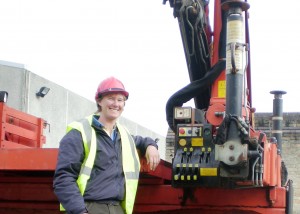 For the last two days I was up in Cambridge at BAS learning to drive the cranes they have mounted on the snow cats. The one I was learning on is actually the smallest one they have. It is a bit like I imagine driving a tank is like – slow and hard to maneouvre. Instead of a steering wheel there are two levers. It was such fun playing around with the machine learning to sling things and move them about the yard. The reason I am being taught this is so that I can load the boats in the water as the slipway was taken out by a storm at Rothera. At Halley which has no boating they take about 2 months to unload the cargo ship and use these machines everyday. Oh and I get a license that looks like your drivers license to allow me to drive them anywhere I want!
For the last two days I was up in Cambridge at BAS learning to drive the cranes they have mounted on the snow cats. The one I was learning on is actually the smallest one they have. It is a bit like I imagine driving a tank is like – slow and hard to maneouvre. Instead of a steering wheel there are two levers. It was such fun playing around with the machine learning to sling things and move them about the yard. The reason I am being taught this is so that I can load the boats in the water as the slipway was taken out by a storm at Rothera. At Halley which has no boating they take about 2 months to unload the cargo ship and use these machines everyday. Oh and I get a license that looks like your drivers license to allow me to drive them anywhere I want!
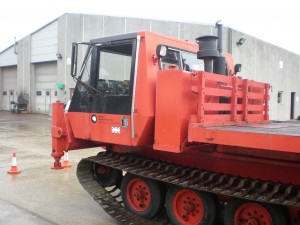
Old Days
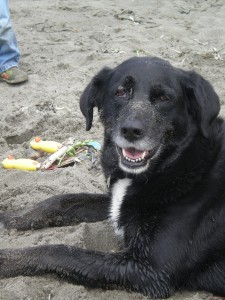 One of the things I am missing and will continue to miss is ‘my’ dog Draeger who is a beautiful Lab Collie mix. I really wish we were able to have dog teams down on base unfortunately they were removed from base in 1994 see the below movie about them.
One of the things I am missing and will continue to miss is ‘my’ dog Draeger who is a beautiful Lab Collie mix. I really wish we were able to have dog teams down on base unfortunately they were removed from base in 1994 see the below movie about them.
Contact with the world!

Lots of people have been asking me about my contact with the outside world when I am on base. So here goes…
Internet – The entire base has a bandwidth of a 1/5 of your broadband you have available to you when you are sitting at home or work reading this post. That bandwidth is for all communication for 120 people with the outside world. A large percent of that is needed to keep the base running and for scientific data transfer. So that leaves a very very small amount for everyone’s personal interactions. So I can’t access websites – no surfing the web, no Skype or posting on facebook etc. I have set up a system where by I can email my blog updates and they will appear on my website so this is the best place to get my news.
Email – I can send and recieve email through my BAS email (my personal email will be forwarded after the spam is removed to my BAS account) maximum file size of 1MB an email. The subject line of the message should only show the words “Personal” i.e. Subject: Personal. When an e-mail is sent to myself, an automatic receipt will be generated by the BAS messaging system advising that your message is queued for transmission and this receipt should be received by you the next time you check your mail. Whilst the various satellite connections provide the potential for a 24/7 service, it should be noted that weather conditions can and do affect its operation. This may mean that the service is interrupted or unavailable at times.
Why the small bandwidth! – well rightly so BAS doesn’t feel it is a good use of the British tax payers resources to provide us on base with enough satellite time for us to surf the internet and the money should go towards the science research. The American bases have full bandwidth and we could as well but it would cost another 1 million pounds a year. On that point BAS spends 45m pounds per year to support all the staff, two ships, airplanes and bases and is the most prolific country in terms of writing science papers from data collected in Antarctica. The US spends the whole BAS budget per year just to maintain the roads at one of their stations – McMurdo!
Letters/Parcels – I can send and receives letters and parcels if you want more information about that go to BAS site. I am based at Rothera and will be there from November through March.
Phone – You can’t phone me! Basically that is what it comes down to. I can however, phone out from base using satellite phone.
Life – BBC1 about Antarctica wildlife
Tonight there was a program on BBC1 called Life. If you click here you will get to the online version of it. The beginning is really amazing about bottlenose dolphin hunting techniques. To get to the stuff about Antarctica without watching the whole hour long program there are three sections you can fast forward to
10:30 on the clock it has about 5 minutes
40:30 to 46:00
48:00 to end
Enjoy… Oh one more amazing fact. Leopard seals can open their mouths 180 degrees and have teeth bigger than lions…
No Polar Bears…
To answer a few more questions..
So despite the cartoons and cards making you think otherwise penguins and polar bears are not found on the same continents!
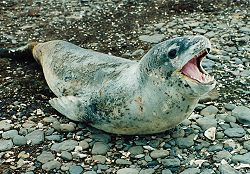
The equivalent of the polar bear in Antarctica is the leopard seal they are the top of the food chain. They have virtually no fear, except for those of orcas, or killer whales. The equivalent in the Arctic of penguins is the puffin.
The word Antarctica comes from the Greek. It means “south of the bear”. They are referring to the word Arcos, which is a constellation that can only be seen in the northern hemisphere.
More than 2000 years ago, Greek writers described a large mass of land in the south of the world. Even though they had never seen it, they believed it must exist so that it could ‘balance’ the land they knew about in the northern half of the world. They named this imagined land ‘Anti-Arkitos’, meaning the ‘opposite of the Arctic’.
There are no native people of Antarctica the only inhabitants are those living on research stations around 5000 in the summer and 1000 in the winter. The Rothera base summer compliment is 120 and winter 21. The closest base to us is the Argentines at San Martin base about 40 miles to the south however, there isn’t any popping over for dinner.

